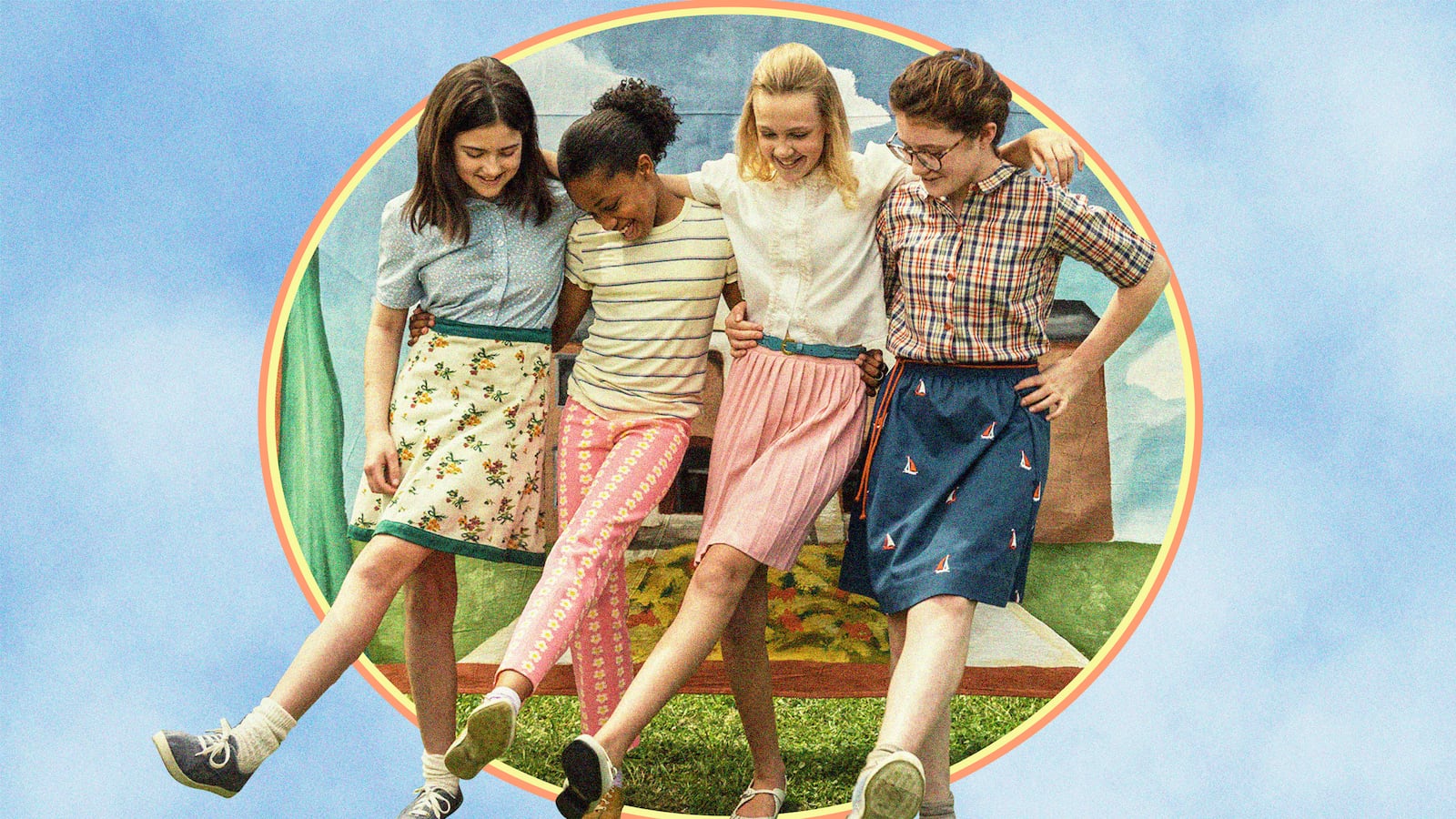When it comes to movies and TV shows about coming of age, sex and sexuality are usually the domain of high schoolers. From Juno to Easy A to Sex Education to Never Have I Ever to Yes, God, Yes to Euphoria, adult actors as old as 30 play characters no younger than 15. At least in contemporary entertainment, high school is generally the cutoff for when it is acceptable to depict characters engaging with sex. The sexuality of middle schoolers, who occupy that precarious age where curiosity has set in but puberty has not quite caught up, is a rarer and more challenging phenomenon to depict onscreen.
Are You There God? It’s Me, Margaret, a film adaptation of Judy Blume’s 1970 book, arrived in theaters on Friday. Like its source material, the film is explicitly interested in how it feels for middle-school girls to encounter puberty and sexuality.
Sixth grader Margaret Simon (Abby Ryder Forston) goes shopping for bras, keeps track of her crushes, gets her first kiss, and tries to make her boobs grow faster. The climactic scene occurs when her friend Nancy Wheeler (Elle Graham) gets her period at a restaurant after months of anxiously anticipating it. At every turn, the story is dialed into the bodily milestones of middle school and the emotional ups and downs they entail.
It’s not a perfect film, but the precision and care with which Are You There God? depicts preteen girls’ uncertainty about their sexuality makes it feel one of a kind. Most stories about middle schoolers simply leave sex out of the picture. Bo Burnham’s Eighth Grade focused more on the perils of online interaction, while the Diary of a Wimpy Kid series homed in on schoolyard bullying, and Stranger Things prioritized the surreal over the corporeal. On the other hand, recent shows that dared to portray middle schoolers thinking about sex have relied on adult actors to capture the confusion of child characters, leaning into shock value to capture the chaos of puberty in formally inventive ways.
In PEN15, the delightfully absurdist Hulu show about the trials and tribulations of seventh grade, Maya Erskine and Anna Konkle star as middle-school versions of themselves, amid a cast of real tweens and teens. Maya and Anna are vulgar and sex-obsessed, especially Maya, who masturbates furiously, sometimes face-down on her bathroom floor. But PEN15 studiously avoids subjecting any of its underage actors to sexual content. In a much-discussed scene from the show’s first season, in which Anna has her first kiss, the show cuts from long shots of Anna and her teenage scene partner staring at each other to close-ups of Konkle’s real-life boyfriend’s face as the two characters lean in for a kiss. Even when it requires labor-intensive editing, the show ensures that adults are the only ones actually involved in the depiction of sexuality.
Big Mouth, Netflix’s raunchy animated comedy, takes a different approach. It uses the freedom of its illustrated form to depict elastic and effervescent cartoon tweens—played, of course, by adult voice actors—performing sex acts that would even be too graphic for live action adult scenes. Seventh grader Andrew (John Mulaney) takes nude selfies for his cousin in his bedroom, while classmate Jay (Jason Mantzoukas) fucks his pillow and his bath mat; meanwhile, their friend Jessi (Jessi Klein) masturbates into a hand mirror. Through the imaginative, liberating powers of animation, Big Mouth can depict middle schoolers’ penises and vaginas, their slobbery attempts at kissing, and their jerky, uncanny orgasms; it can revel in crassness without exploiting child actors.
That wasn’t always a concern. As Brooke Shields recounted in her recent documentary, Hulu’s Brooke Shields: Pretty Baby, filmmakers and audiences sexualized her from a shockingly early age. At 12, she starred in 1978’s Pretty Baby as a child sex worker whose virginity goes up for auction; that same year, High Times described her as “a sultry mix of all-American virgin and nascent whore.” At 15, Shields starred in 1980’s Blue Lagoon as a young girl stranded on an Edenic island with her cousin, for which she shot several nude scenes. Director Randal Kleiser advertised the film as a “reality show,” an insight into her “actual sexual awakening,” the better to harness the underage Shields’ status as a national sex symbol.
But Are You There God? is more interested in what a child might think of sex than in imposing adult notions of sexuality onto a child’s body. In an early scene, Nancy practices making out with her bedpost in front of a horrified Margaret, insisting that “it’s important to experiment,” lest she grow up to be a bad kisser. It’s a hilariously effective rendering of a middle schooler’s approach to physical intimacy; Nancy is both overconfident and petulant, tonguing the wooden sphere with careless abandon and then crossly demanding to know what Margaret thinks is so weird about it. But even her defensiveness about practicing kissing slips away quickly. Soon, she moves on to the next topic of conversation: bringing Margaret down to the yard to play in the sprinklers.
Nancy isn’t old enough to bear the visceral shame about sex that afflicts the seventh graders of PEN15 and Big Mouth. She still has a child’s utter lack of self-consciousness, and she treats kissing less as a realm of the erotic and more as a hobby you can take up with your friends. The ease with which she takes up, then abandons, the act of kissing is characteristic of childhood fantasy. For Nancy, kissing has no material or physical consequences; it is not accompanied by any arousal. It’s merely an imaginative game that involves preemptively enacting adulthood, the better to understand and control such an experience once it arrives. It is a safe, solitary act, a year or two removed from the kind of play where you mash your dolls’ faces together to make them kiss.
It’s the exact opposite of how Shields was treated in Pretty Baby or Blue Lagoon, made to perform for the arousal of older men both in the scene and in the audience; instead, Nancy’s curiosity is rooted in a childlike desire to try something new in the privacy of her bedroom.
Her childishness pokes through elsewhere, too. After Margaret and Nancy strut through the sprinklers, pretending to catwalk in the grass, Nancy’s older brother Evan (Landon Baxter) and his friend Moose (Aidan Wojtak-Hissong) make fun of the girls, sending Nancy screaming for her mom. She reverts to the same instinct to call her mom in the scene when she gets her period; when the camera reveals Nancy shivering on the toilet, face wet and smeared with tears, it’s clear that menstruation, that celebrated milestone of achieving womanhood, has not altered the essential fact that she is still a child. Entering puberty, and working to understand her body and her sexuality, has not propelled Nancy forward into a new stage of life so much as underscored her immaturity.
By allowing its young characters to teeter so frequently between adolescent overconfidence and childlike vulnerability, Are You There God? creates a scorchingly intimate depiction of middle schoolers’ nascent sexuality that feels unprecedented. Previous art on the subject has adopted a distinctly adult perspective, whether through the bawdy parody of PEN15 and Big Mouth or through the lust for virginal naïveté embodied by Pretty Baby and Blue Lagoon. But Are You There God? is a loving portrait of girlhood in all its brazen cluelessness.
The film has so many subtleties worth noting—like the emotional remoteness of Nancy’s makeout with her bedpost, or the untrained quality of her and Margaret’s fake catwalk through the yard, as they strut stomach-first, trying to look sultry but landing closer to gangly. These are thrilling moments, which capture exactly how it feels to be a middle schooler in a middle schooler’s body. It’s a feeling most viewers have rarely seen depicted on screen.








